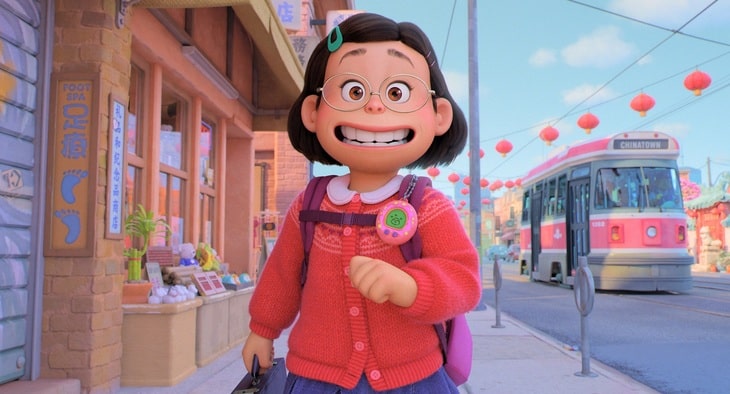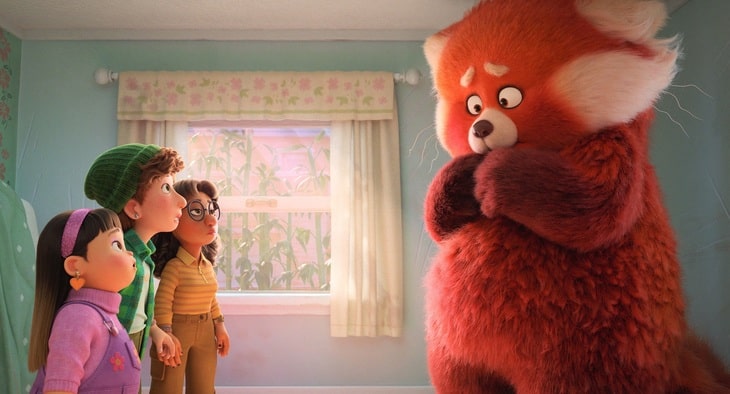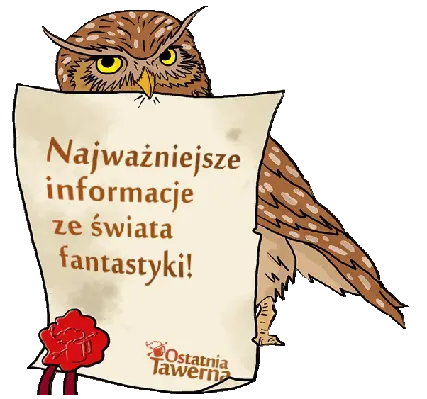The new Pixar animation perfectly fits in the direction chosen by the creators more and more – the focus is no longer on constructing a world where good and evil are clearly separated and have no contact points, but imperfect reality. There are no classic villains in the film, instead, you should be prepared for a large dose of ambiguity – black is never just black, and sometimes … red.
“The most important rule in my family – respect your parents”
Domee Shi, known to cinema fans from the short film Bao , invites viewers to Toronto. However, the heroes are not ordinary Canadians – the Lee family, although deeply rooted in the New World, never decided to abandon their culture – the most visible example of this is the dedication with which they care for the temple, which is not only their livelihood, but also allows them to honoring the memory of ancestors. Burning incense and reciting affirmations of thanks are not, however, a sufficient sacrifice. One can find here a similarity to the story presented in Mulan, however, at the beginning of the new millennium. To honor the family, you no longer need to save China, but fight a battle with yourself to be the perfect child. This task turns out to be a challenge, especially considering the usually taboo subject of adolescence. The main character is convinced of this, and to the horror of her parents, she enters a hormonal storm with great strides.

Press materials of the film “To nie wypanda” by Galapagos Films
Pandemonium
Meilin Lee is a thirteen-year-old girl who has known exactly what she wants in her life so far and has not hesitated to reach for it. However, growing up quickly revealed the brutal truth to her: it turns out that the girl’s independence is only an illusion of free choice – she can do whatever she wants, as long as it coincides with the wishes of her loving, but also a little overprotective mother. . This becomes clear when Meilin and a group of his friends decide to go to a concert of the 4 * Town band. Despite excellent grades at school, impeccable behavior, and attending a series of extracurricular activities, she does not get permission from her parents, which instills in the teenager a desire to rebel against the system.
Perhaps there would be nothing amazing about it, after all, almost every teenager has a similar experience – with high probability, parents even thought that instead of angels, they are now dealing with monsters. For Meilin, this transformation takes place quite literally: she turns into a giant red panda that destroys everything it encounters on its way, without sparing the excessive expectations of its mother.
Maturation without retouching
This is not an animation in which everyone will find something for themselves. Although the main character has Chinese roots, the screen displays a dizzying cultural diversity, as evidenced even by a group of her closest friends who are Japanese, Jewish and Indian, respectively. However, we are talking not only about cultures – the screen also shows large noses, glasses, orthodontic appliances, wide hips and a whole lot of other features that we have to consider as defects. While the slightly caricatured anime-inspired style may not be to everyone’s taste, it is unquestionably a giant leap forward since only long-haired princesses with symmetrical faces and microscopic waists appeared on the screens.
However, what aroused the greatest controversy, and which is a definite novelty in the animations aimed primarily at the younger audience, was the presentation of the biological aspects of maturation – at some point in the frame a pack of sanitary napkins appears in the frame. In a way, maturation is monstrous, because the body changes before our eyes, not always the way we want it to. Extra pounds? Unwanted hair? Unpleasant smell? Fantasies appearing out of nowhere? All this and more are experienced by teenagers all over the world – the adventures of Meilin and her friends can cause a smile on your face, tears of emotion, but also shivers of embarrassment, often at the same time.

Press materials of the film “To nie wypanda” by Galapagos Films
Carefree years 00.
Domee Shi has made a difficult art because she has managed to kill two birds with one stone and create a film that will appeal to at least two generations. On the one hand, This is not a popular audience, but the action takes place at the beginning of the new millennium, which means that the generation born in the 1990s will surely go to the cinemas. In many cases, the members of this generation formation themselves have become already parents. Shi, herself born in 1989, shows that the victims of adolescence are not only children but also their parents. In this production, the person who feels it the most is the mother of the main character, who at first glance seems to be a villain. It ‘s not a rushnothing is as it seems. Crazy mother and monster daughter or the perfect housewife and her perfect child? Shi plays with expectations, deftly juggling stereotypes and giving the viewer a shot in the nose every time he thinks he has managed to label a character.
Incidentally, it is worth noting that for the generation of the 90s, the screening will also be a nostalgic journey into the past, which Shi was well aware of. The film is full of various references to this period, ranging from posters advertising Finding Nemo? ending with a parody of Twilight . A nice addition to the ear is the soundtrack consisting of 4 * Town songs. If someone is a fan of the slightly candy-like sound characteristic of boy bands from the 00s, they will be disappointed – although the songs are fantastic, as evidenced by their popularity ( Nobody Like U has over 75 million plays on Spotify!), The band was unfortunately created exclusively for needs animation and has no plans to go on a world tour.
Taming the beast
This is not a rushin this sense it is a family oriented animation and it is not just an empty phrase. In this seemingly innocent animation, Domee Shi included topics of great importance, but the form in which they are presented means that this film can replace more than one awkward conversation between parents and children, and may even initiate a completely different type of dialogue based on confession. to your weaknesses, which in turn gives the opportunity for understanding to emerge. Instead of being shocked by the sight of sanitary napkins, one should first of all admit that the period of puberty and the inherent need to gain autonomy are not a monstrous thing at all, although it may seem so many times, but a natural course of things. The fight against this state is not only breakneck, but above all doomed to failure. It’s hard to find a second animation which goes so deep while doing it with such delicacy. One can only hope that this topic will be developed in an equally creative way from the male perspective.


